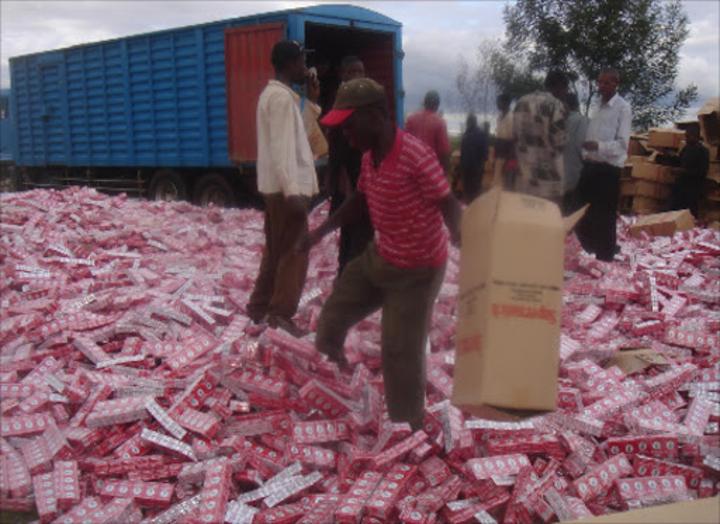Africa-Press – Kenya. Kenya race to achieve a 20 percent GDP contribution from the manufacturing sector in the country will need a radical change in policy and taxation according to industry players.
According to Manufacturing Priority Agenda (MPA) 2023, it was observed that Kenya has been enacting tax laws that disincentive manufacturing despite the low capital investment in the country.
Manufacturers have outlined key government interventions that could help the industry to increase its contribution to the country’s economic growth while at the same time maintaining the sustainability of the business operations.
The sector was among the priority areas in the Vision 2030 economic blueprint by former president Uhuru Kenyatta.
Businesses have already started aligning with the growth strategy.
BAT Kenya’s managing director, Beverley Spencer-Obatoyinbo says that to grow the contribution to the country’s economy, the company has been diversifying into alternative tobacco and nicotine products to grow operations.
The company is also looking to compensate for the rapidly shrinking cigarette market, especially in its major markets with a Sh2.5bn investment in a world-class modern oral nicotine factory as the company looks to increase its
“We are pushing forward with our planned investment so that we can help contribute to the country’s economic recovery, and signal to the world that Kenya is open for business. Our new oral nicotine manufacturing is a testament to our commitment to the Government’s manufacturing agenda,” says Spencer.
According to the firm, this factory will increase our manufacturing and export footprint, create more jobs, and meet the needs of Kenyan consumers for greater choice, more innovation and less risk.
Being the first unique investment in the region it will serve as a potential export hub for EAC partner states and beyond.
In the half year ending June 2022, BAT Kenya recorded a 7.4 per cent rise in net profit to Sh2.9bn ($24m), attributed to greater export volumes and higher tobacco prices in the domestic market despite tax hikes in Kenya.
However, the number could be higher but taxation and tougher rules locally have led to increased consumption of smuggled cigarettes which denies the state its revenue.
According Smuggling trade at the infamous Busia border and other points has over the years made cigarettes available cheap, thereby increasing consumption.
BAT Kenya estimates that the illegal tobacco trade in Kenya accounted for over 12 per cent of the market at the end of 2017 – denying the government some Sh2.2 billion in excise revenues from legitimate cigarette sales.
“Despite this investment and strong business performance, BAT Kenya remains concerned by the impact of illicit trade in Kenya, where one in ten cigarettes now smoked is illegal,” BAT said in a statement.
It notes that unfortunately, the recent declines in the incidence of illicit cigarettes originating from Kenya has been almost entirely offset by the increase in the volume of tax-evaded cigarettes coming into Kenya across the Ugandan border, which by our estimate now accounts for approximately 90 percent of all tax-evaded cigarettes sold in Kenya.
These are predominantly cigarettes comprised of non-Kenyan tobacco leaves.
The illegal sales are therefore adversely impacting, not just government revenues and local manufacturers, but also Kenyan tobacco farmers by impacting demand for Kenyan leaf.
The Kenya Association of Manufacturers (KAM), however, estimates that 40 percent of manufacturers’ market share is lost every single year to counterfeits or Sh30 billion $42 million).
In an effort to increase the participation of manufacturing companies to the country’s economy as a leading manufacturer, tax-payers, exporters and foreign currency earners industry players are recommending taxation review measures.
“Kenya is increasing the incentive for smugglers to bring in duty-evaded product from neighboring countries and for affordability-stretched consumers to purchase smuggled products,” said Spencer
BAT Kenya contributed over Sh80 billion to national revenue through various taxes Excise Duty, Value Added Tax (VAT), Pay as You Earn (PAYE) and Corporation Tax throughout the same period.
The 2022 economic survey shows that the manufacturing sector created 336,800 jobs in 2021 in both the public and private sectors, a decline from 343.7 thousand jobs created in 2017.
Given that a manufacturing GDP of 7.24 per cent in 2021 was equivalent to 336,800 jobs, holding other factors constant, a manufacturing GDP contribution of 20 per cent by 2030 will yield about one million jobs.
For More News And Analysis About Kenya Follow Africa-Press






